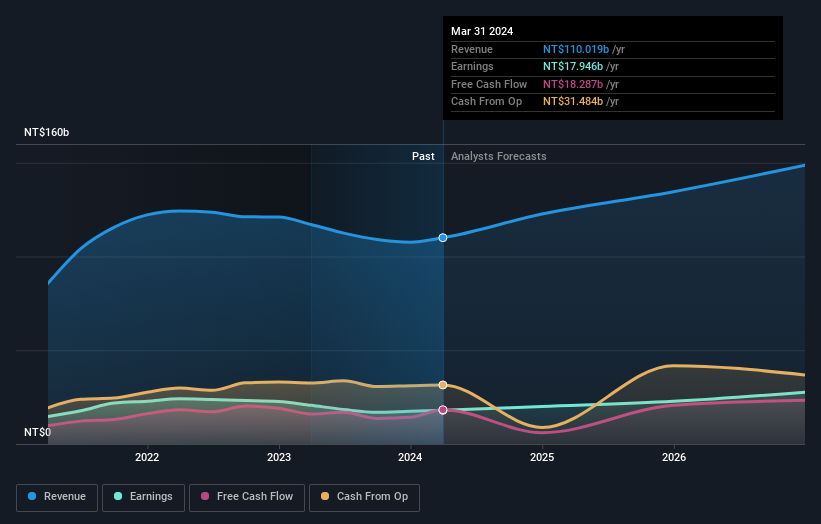Stock Analysis
- Taiwan
- /
- Electronic Equipment and Components
- /
- TWSE:2327
Institutions along with retail investors who hold considerable shares inYageo Corporation (TWSE:2327) come under pressure; lose 5.1% of holdings value

Key Insights
- Significant control over Yageo by retail investors implies that the general public has more power to influence management and governance-related decisions
- A total of 25 investors have a majority stake in the company with 48% ownership
- Institutions own 29% of Yageo
A look at the shareholders of Yageo Corporation (TWSE:2327) can tell us which group is most powerful. We can see that retail investors own the lion's share in the company with 47% ownership. In other words, the group stands to gain the most (or lose the most) from their investment into the company.
While institutions who own 29% came under pressure after market cap dropped to NT$305b last week,retail investors took the most losses.
Let's take a closer look to see what the different types of shareholders can tell us about Yageo.
See our latest analysis for Yageo

What Does The Institutional Ownership Tell Us About Yageo?
Institutional investors commonly compare their own returns to the returns of a commonly followed index. So they generally do consider buying larger companies that are included in the relevant benchmark index.
As you can see, institutional investors have a fair amount of stake in Yageo. This suggests some credibility amongst professional investors. But we can't rely on that fact alone since institutions make bad investments sometimes, just like everyone does. It is not uncommon to see a big share price drop if two large institutional investors try to sell out of a stock at the same time. So it is worth checking the past earnings trajectory of Yageo, (below). Of course, keep in mind that there are other factors to consider, too.

We note that hedge funds don't have a meaningful investment in Yageo. Our data suggests that Tie-Min Chen, who is also the company's Top Key Executive, holds the most number of shares at 7.1%. When an insider holds a sizeable amount of a company's stock, investors consider it as a positive sign because it suggests that insiders are willing to have their wealth tied up in the future of the company. The second and third largest shareholders are Dominant Investment Holdings Ltd and Prc Holdings Limited, with an equal amount of shares to their name at 5.0%.
A deeper look at our ownership data shows that the top 25 shareholders collectively hold less than half of the register, suggesting a large group of small holders where no single shareholder has a majority.
While it makes sense to study institutional ownership data for a company, it also makes sense to study analyst sentiments to know which way the wind is blowing. There are plenty of analysts covering the stock, so it might be worth seeing what they are forecasting, too.
Insider Ownership Of Yageo
The definition of company insiders can be subjective and does vary between jurisdictions. Our data reflects individual insiders, capturing board members at the very least. Management ultimately answers to the board. However, it is not uncommon for managers to be executive board members, especially if they are a founder or the CEO.
Insider ownership is positive when it signals leadership are thinking like the true owners of the company. However, high insider ownership can also give immense power to a small group within the company. This can be negative in some circumstances.
We can see that insiders own shares in Yageo Corporation. Insiders own NT$22b worth of shares (at current prices). Most would say this shows a good alignment of interests between shareholders and the board. Still, it might be worth checking if those insiders have been selling.
General Public Ownership
The general public, who are usually individual investors, hold a 47% stake in Yageo. While this size of ownership may not be enough to sway a policy decision in their favour, they can still make a collective impact on company policies.
Private Company Ownership
We can see that Private Companies own 17%, of the shares on issue. Private companies may be related parties. Sometimes insiders have an interest in a public company through a holding in a private company, rather than in their own capacity as an individual. While it's hard to draw any broad stroke conclusions, it is worth noting as an area for further research.
Next Steps:
It's always worth thinking about the different groups who own shares in a company. But to understand Yageo better, we need to consider many other factors. For example, we've discovered 1 warning sign for Yageo that you should be aware of before investing here.
Ultimately the future is most important. You can access this free report on analyst forecasts for the company.
NB: Figures in this article are calculated using data from the last twelve months, which refer to the 12-month period ending on the last date of the month the financial statement is dated. This may not be consistent with full year annual report figures.
New: Manage All Your Stock Portfolios in One Place
We've created the ultimate portfolio companion for stock investors, and it's free.
• Connect an unlimited number of Portfolios and see your total in one currency
• Be alerted to new Warning Signs or Risks via email or mobile
• Track the Fair Value of your stocks
Have feedback on this article? Concerned about the content? Get in touch with us directly. Alternatively, email editorial-team (at) simplywallst.com.
This article by Simply Wall St is general in nature. We provide commentary based on historical data and analyst forecasts only using an unbiased methodology and our articles are not intended to be financial advice. It does not constitute a recommendation to buy or sell any stock, and does not take account of your objectives, or your financial situation. We aim to bring you long-term focused analysis driven by fundamental data. Note that our analysis may not factor in the latest price-sensitive company announcements or qualitative material. Simply Wall St has no position in any stocks mentioned.
Have feedback on this article? Concerned about the content? Get in touch with us directly. Alternatively, email editorial-team@simplywallst.com
About TWSE:2327
Yageo
Engages in the manufacture and sale of passive components in China, Europe, the United States, and rest of Asia.
Undervalued with excellent balance sheet and pays a dividend.

